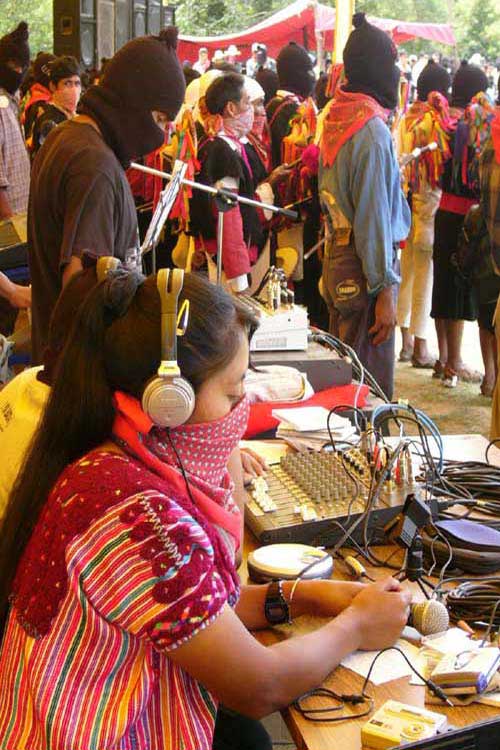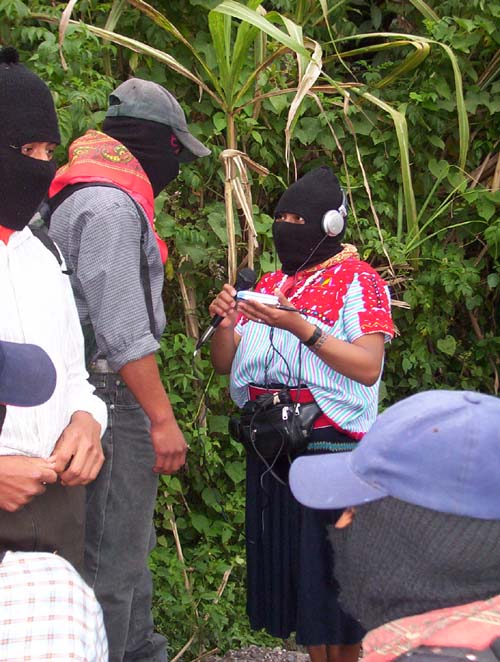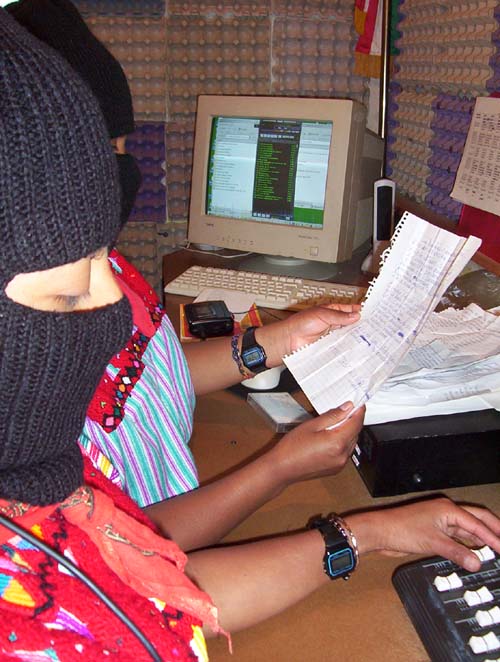On January 1, 2006, the convoy that accompanied Subcomandante Insurgent Marcos departed from the Garrucha Caracol to San Cristobal de las Casas. With that marked the first step in the new Zapatista political initiative known as The Other Campaign, which hopes to forge an anti-capitalist alliance of the non-electoral Left in Mexico. The journey culminated with a public rally in the Cathedral Plaza, known as the Plaza of Resistance, where members of Zapatista Command spoke. Nearly 300 people of the Highlands region of the state of Chiapas, who have signed on to the zapatista initiative gathered with subcomandante Marcos, now called Delegate Zero, in his first day of the Other Campaign.


..................................................................................................................................................................
To all the compañeros and compañeras of the "Other":
To the Committees, Coordinators (or however they are called) which are being formed in each state or region in order to help with the first stage of the EZLN's Sixth Committee national work
To the Security Committees which have been formed, or are being formed, for the accompaniment and security of SubDelegado Zero during this first stage:Compañeras and compañeros:
Greetings from our compañeros and compañeras of the "Other." We are writing you in order to propose some criteria for security at the meetings and activities in which SubDelegado Zero will be participating.
First - It is always better (and more effective) to avoid arrogance and grandstanding. It is not about isolating, but about accompanying and protecting. A security team is effective if it does its work without being noticed. In no way will the EZLN's Sixth Committee accept any persons on their security team who are of any nationality other than Mexican.
Second - The work of security and accompaniment is avoiding problems due to crowds (in the unlikely event that there are any), preventing (as far as possible) any bad acts by some "anti-otra," and, most importantly, seeing that SubDelegado Zero does not get lost while going from one place to another (for example, making a "mistake," with obvious trickery, with the door when going to the bathroom and going into the "ladies" instead of the "gents").
Third - In the event that the bad governments attempt some repressive measure, do not put up any resistance (especially if there are shots), and step aside. In no way should you put your life or liberty at risk. Always have identification with you and the help of human rights, always maintaining the truth, that is, that you are exercising a legal and legitimate civil right. You will not be violating any law by being next to an individual with a ski-mask and an elegant profile (with the contribution of the tummy).
Fourth - In the event of detention, SubDelegado Zero knows what to do and, above all, what not to do. And so do not worry yourselves by imagining what you will do in such and such a horrible event. The response is: run, take shelter, inform, disseminate, mobilize...send me tobacco.
I am, in advance, not authorizing anyone or any organization to assume, WITHOUT MY EXPLICIT VERBAL AND WRITTEN REQUEST, the legal defense of my person.
Fifth - Neither the EZLN nor its Sixth Committee will be asking for any guarantees from federal, state or municipal officials. We do not expect anything, nor will we ask for anything, from those who have always treated us with contempt and disdain. If any Committee or Coordinator from a state or region decides to request from their respective officials respect for the liberties of meeting, association and movement, which are the prerogatives of any citizen, we are respectfully asking that they do so in their name, not in ours. Even if they threaten us from above or promise us detentions, jails, clandestine cellars or cemeteries, we shall go out to do the work which we committed ourselves to in the Sexta.
Sixth - In the event of any major mishap, public statements or not, and the decisions which our organization will take, are the SOLE AND EXCLUSIVE purview of the top command level of the EZLN.
Seventh - Whatever happens, know that it is an honor, and it shall be, to have you as compañeros and compañeras in struggle.
From the mountains of the Mexican Southeast
SubComandante Insurgente Marcos
SubDelegado Zero of the Sixth Committee of the EZLN
Mexico, December of 2005
..................................................................................................................................................................
Compañeros, compañeras, support bases of the Zapatista Army of National Liberation, brothers and sisters of national and international civil society, good evening to everyone.
Today it is 11:50 minutes southeastern time. Welcome to our Resistencia Hacia un Nuevo Amanecer Caracol. Once again we are joining together, men, women, boys, girls, young people and old ones, to remember and to celebrate the 12th anniversary of the armed uprising, and we are also remembering our compañeros who fell in combat in 1994. Please be so kind as to accompany us in observing a moment of silence.
There have been 12 steps forward in building its history and making a reality of its transformation of struggle. And for 12 years we have also worked to strengthen and to build what did not exist before. Now there is hope and dignity for men, women, indigenous and non-indigenous to continue struggling with rebellion. Our Caracol of Resistance is a name of dignity, but we are the ones who give it shape. We are the ones who struggle, live and die. We are those of rebel dignity. We are the ones who built it and work it and watch over it in its growth..
Compañeros and compañeras, EZLN support bases, for 12 years we have been resisting attacks of all kinds. They have attacked us with bullets, with torture and jail, with lies, contempt and forgetting, but here we are, and we, the most small of this land, shall continue. And here we will continue being zapatistas, even though the bad government wants to do away with our Autonomous Municipalities, which they attentively listen to and watch. They do not want what they see. This struggle has begun, and no one can stop it.
Brothers and sisters of civil society, our hearts are made glad today to share with you, and we give you greetings of hope. It is only by being together and only as brothers that we can really respect each other and help each other, shoulder to shoulder, demonstrating to the powerful of the color of money and to those who exploit that there are many hearts in the world which are joined together, who help each other, who work united together in things they have in common, helping each other in their struggles and respecting each other's differences in order to build that new world where many worlds fit.
The true peoples have sown different works through autonomy, and they are working like the most first peoples. When it is the new moon, as it is now, they sow, in order to yield good fruit to feed themselves, through that, for the future.
Autonomy has allowed the peoples to build their regulatory, political, economic, social and cultural systems by themselves. We want autonomy so that we are all of value all the time, so that the one who governs, governs obeying.
They have named their different authorities and different committees for the operation of the Autonomous Municipalities and the Good Government Junta, so they will keep working. It is not necessary to be zapatista in order to be taken care of and respected by the authorities in any part of our rebel territory. We, the zapatistas, are not going to attack anyone, not those brothers who are not zapatistas. We will be respectful with all our indigenous brothers, without regard to their organization, their party or their religion, always and as long as they respect us. The people themselves decide when to change or remove a compañero from a position, but none of the compañero authorities can receive any salary.
Brothers and sisters, the Good Government Junta is grateful to this zapatista village, La Garrucha, to everyone, men, women, boys, girls, young people and old ones who have helped us through their great efforts in giving us this space for the gathering and who are continuing to organize more in order to move forward with our revolutionary struggle by the zapatista support base compañeros and grateful also to national and international civil society.
Brothers and sisters, we have nothing else to give you other than our seeds of hope, other than our rebel and indigenous dignified hearts. Take them in order to continue scattering more seeds among your different peoples of the world.
Liberty, justice and democracy.
Viva Compañero Sup Comandante Insurgente Marcos
Viva the EZLN.
Vivan the peoples in resistance.
Viva the Resistencia Hacia un Nuevo Amanecer Caracol.
Viva national and international civil society.
Viva the people of La Garrucha.
Vivan the Clandestine Revolutionary Indigenous Committees.
Vivan the compañeros fallen in combat in 1994.
Vivan the Autonomous Municipalities in resistance.
Viva the Sixth Declaration of the Selva Lacandona.
Viva the Other Campaign.
..................................................................................................................................................................
Radio Insurgente
Giving Voice to the Voiceless
By Deepa Fernandes
It’s dark—the kind of profound darkness that a lack of electricity ensures in a mountainous jungle region.
A dull pulse carries through the night of the southeastern Mexican state of Chiapas like an old woman’s heartbeat. It’s 4 a.m., and one can hear what has been a regular soundtrack at this hour for hundreds of years: a steady pounding as creased and callused brown hands massage dough for the day’s tortillas.
And for the past year, Chiapas has greeted 4 a.m. with another soundtrack.
Fade in crackle, which quickly disappears, replaced by a clear and youthful female voice:
“Muy Buenos Dias.”/“A very good morning.”
The voice is that of an insurgent fighter with the Ejército Zapatista de Liberación Nacional (EZLN), perhaps one of the world’s quietest and most powerful rebel armies. The world knows them as the Zapatistas.
“Estás escuchando Radio Insurgente, la voz de los sin voz./“You are listening to Radio Insurgente, the Voice of the Voiceless.”
The voice is being relayed to nearby Zapatista autonomous communities from a makeshift and very clandestine radio studio. The Zapatistas have built egg carton-lined studios, erected transmitters and trained themselves to operate a radio station. Hundreds of years of media voicelessness ended in August 2003 with daily, 16-hour broadcasts.
“...voz oficial del Ejército Zapatista de Liberación Nacional.”/ “...official voice of the Zapatista National Liberation Army.”
She is the official voice of the EZLN on the Zapatista radio network. The intimacy and immediacy of this uncensored mass communication is something that the indigenous rebel army has never before had.
“Son las cuatro de la madrugada.”/“It’s four in the morning.”
Zapatista time. Daybreak. Fade in Zapatista national anthem.
The EZLN has said that access to and control of the media are vital for its community’s survival. And while successive Mexican governments have surrounded Zapatista communities with armies and allowed soldiers and paramilitaries to unleash terror on indigenous peoples, the Zapatistas have worked quietly to build the capacity to speak directly to their people. So quietly in fact, that when the Zapatista broadcasts first hit the airwaves, playing popular music and reading saludos from listeners, even government loyalists unwittingly tuned in.
“Radio Insurgente is a radio station that is completely independent from the bad Mexican government,” explains the network’s Web site, radioinsurgente.org. This past November 17, the day the EZLN celebrated its 21st anniversary, the station launched an Internet audio version of the clandestine network. From recordings of local indigenous musicians and story-tellers to political speeches by EZLN leaders, the Internet audio archive serves as a history of Mexico’s indigenous people.
“… transmitiendo desde algun lugar de las montanas del sureste Mexicano.”/ “… transmitting from someplace in the southeastern Mexican mountains.”
Stories circulate about the Zapatistas’ masked leader, Subcommandante Marcos, sitting in a mud hut in the jungle writing communiqués on his newly upgraded Dell lap-top. Indeed the Zapatistas have taken full advantage of new technologies.
Mexico’s indigenous insurgents have kept close to the ground, expanding their FM community radio reach to between two and four radio stations and teaching radio skills to young women insurgents. Zapatista division of labor assigns men the technical roles and women the programming, on-air and reporting roles.
“Las reporteras de radio insurgente estuvieron en el lugar de los hechos. Asi que podemos transmitirles un resumen de lo que grabaron …”/ “Radio Insurgente reporters were on the spot and we bring you this summary of what we recorded …”
Radio Insurgente reports breaking news from Zapatista and indigenous communities, blending political education with on-the-ground reporting. Take the April 10 incident this year in the community of Zinacantan, when community leaders went to see municipal authorities to demand access to potable water for their communities and were attacked en route by thugs from the Party of the Democratic Revolution. Reporters from Radio Insurgente were on the spot. They transmitted interviews with witnesses and those who were attacked about both the incident and their opinions about the revolutionary peasant leader Emiliano Zapata, whose death 85 years ago was being commemorated in Zinacantan when the attack occurred. That program is now archived on the new Web site.
While providing information on the Zapatista struggle for autonomy and acting as a lifeline to the world, the Web site also serves as the legal arm of Radio Insurgente. It is archiving for posterity what has been broadcast to the inhabitants of the Chiapan jungles just in case the Mexican army shuts down the daily radio signal.
Mexican broadcast law, similar to Federal Communications Commission laws in the United States, requires that one have a license to send out a radio signal. Red tape and corporate control of the media make it next to impossible for anyone to succeed in getting a license. Yet, tiny low-power wattage stations exist all over Mexico—all subject to threats and harassment by the Mexican military.
In mid-September an indigenous station in the neighboring state of Oaxaca was violently raided by some 200 soldiers and police. Equipment was seized and destroyed, and 14 people were arrested.
Fear of reprisal, however, has not daunted the Zapatistas. Programming has blossomed. The new Web site makes hour-long news specials available for radio stations to download and play. It features public service announcements that educate the public about violence against women and advertise upcoming programs like a special on Che Guevara. The Web site also archives speeches and communiqués by EZLN leaders, blending everything with Zapatista liberation songs and local music.
“Este programa va dirijido a todos los campesinos y tambien a los indigenas que luchan por una vida major.”/“This program is dedicated to all the farmers and indigenous people who are fighting for a better world.”
By adding to the thriving landscape of independent media in Mexico, Radio Insurgente is fulfilling a long-held dream of El Sup (Marcos), who once noted that “independent media tries to save history—today’s history—tries to save it and tries to share it so it will not disappear.” One wonders if Marcos had any idea back in 1997 when he issued this communiqué that a Zapatista-controlled, internationally accessible public audio archive of its people’s history was only a few years away.
“Ahora vamos a escuchar a Mercedes Sosa que nos canta Alcen la Bandera. …”/ “Now let’s listen to Mercedes Sosa singing ‘Alcen la Bandera.’ …”
Some worry that the Mexican government may try to shut down the Web site and the radio stations. The insurgent women who are responsible for the bulk of the programming, whose voices grace the airwaves from 4 a.m. through the night, realize the signal could be squelched at any moment. But for now, with the eyes and ears of the world drinking in the MP3 sounds of Radio Insurgente, it seems like the Fox government may have missed its chance to silence the voiceless.
“Mucho animos para sus trabajos y que pasa una buena noche.”/ “Keep up your spirits in your work and have a good night.”




